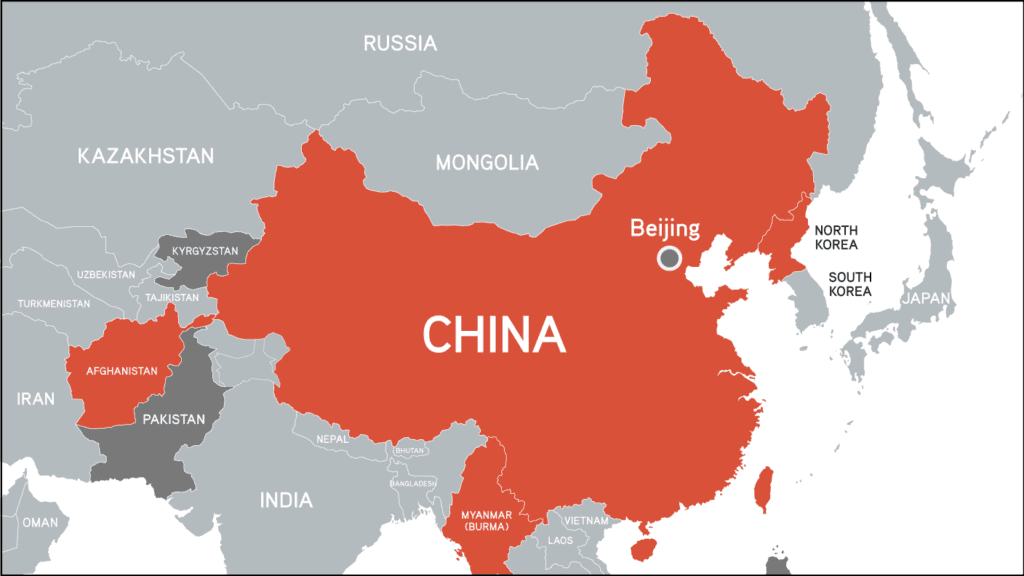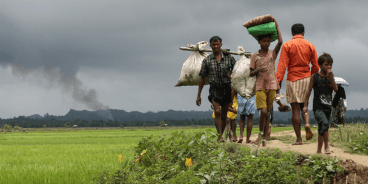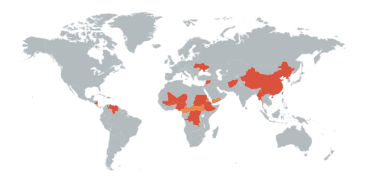
People’s Republic of China

The Chinese government is committing possible crimes against humanity and genocide by systematically persecuting Uyghurs and other predominantly Muslim and/or Turkic groups.
BACKGROUND:
Under the guise of combating religious extremism, in recent years Chinese authorities in the so-called Xinjiang Uyghur Autonomous Region (the Uyghur Region) have increased persecution of the ethnic Uyghur community, as well as Kazakhs, Kyrgyz and other predominantly Muslim and/or Turkic groups. While China has perpetrated repressive campaigns against these groups for several decades, abuses have significantly escalated since 2017 when authorities in the Uyghur Region passed the “Regulation on De-extremification,” which imposed severe restrictions on religious freedom and practice, including through preventing individuals from praying, growing beards or playing Uyghur music.
Since 2017 Uyghurs and other predominantly Muslim and/or Turkic groups have been subject to mass arbitrary detention, often accompanied by widespread rape, sexual abuse and torture, as well as coercive campaigns to reduce birth rates, including through forced abortions and sterilizations. UN experts have warned that the Chinese government has exponentially increased policies in recent years that allow for the forcible transfer of children to state-run orphanages or boarding schools.
More than 100,000 Uyghurs are also working under conditions that strongly suggest forced labor. Reports have identified at least 135 detention facilities in the Uyghur Region that have on-site factories where detainees are allegedly forced to work. In November 2021 the Helena Kennedy Centre for International Justice reported that over 100 international brands may be tied to Uyghur forced labor-produced cotton while the Coalition to End Forced Labour in the Uyghur Region has found that 45 percent of the world’s polysilicon comes from the Uyghur Region, implicating nearly the entire global solar panel industry. Forced labor is also tied to the agricultural, aluminum and automobile sectors.
The governments of Canada, the United Kingdom (UK) and the European Union (EU) have sanctioned Chinese government officials and taken steps to ban goods tied to Uyghur forced labor. The US government’s Uyghur Forced Labor Prevention Act, which took effect in June 2022, prevents the import of goods made “in whole or in part” in the Uyghur Region from entering the country. While this has impacted the entry of electronics, pharmaceuticals and clothing, it has minimally impacted other industries with complex supply chains and weak regulation, such as the country’s fishing industry, which continues exports to the United States (US) and Europe.
The expansion of detention and labor facilities has coincided with increased restrictions on religious practice. According to the Uyghur Human Rights Project, at least 1,046 imams and other religious figures from the Uyghur Region were detained in camps or imprisoned between 2014 and 2021, and Uyghurs around the world face intense surveillance. Authorities have also engaged in the systematic destruction of Uyghur cultural heritage as a part of policies to Sinicize religion. In recent years, the state-led crackdown on Islam has expanded beyond the Uyghur Region, including through the destruction and repurposing of mosques and other Islamic venues in Ningxia and Gansu – areas home to China’s largest Muslim population outside of the Uyghur Region.
In January 2021 the US formally accused China of committing genocide and crimes against humanity against the Uyghur population and members of other predominantly Muslim and/or Turkic groups. Since then, the parliaments of Belgium, Canada, Czech Republic, the EU, France, Lithuania, the Netherlands and the UK have also recognized the situation in the Uyghur Region as constituting genocide and/or crimes against humanity.
Former UN High Commissioner for Human Rights Michelle Bachelet released a report on the human rights crisis in the Uyghur Region in August 2022. The report determined that the extent of arbitrary and discriminatory detention of Uyghurs and other predominantly Muslim and/or Turkic groups may constitute crimes against humanity, and that conditions remain in place for serious human rights violations to continue. In November 2022 the Committee on the Elimination of Racial Discrimination adopted a decision under its “early warning and urgent action procedure” and referred the situation to the UN Office on Genocide Prevention and the Responsibility to Protect.
RECENT DEVELOPMENTS:
During a surprise visit to the Uyghur Region on 26 August, President Xi Jinping condoned the government’s discriminatory practices, including through deepening efforts in controlling purported “illegal religious activities” and continued counterterrorism measures. Following a visit in mid-August by a 25-state delegation from the Organization of Islamic Cooperation (OIC), Chinese media quoted some representatives as having praised the region’s prosperity and development.
More than 160 governments participated in China’s Universal Periodic Review (UPR) on 23 January 2024. Twenty cross-regional delegations specifically called on the government to implement recommendations issued by the UN human rights system, including the High Commissioner’s August 2022 report.
In February the Chinese government further expanded regulations to restrict freedom of religion in the Uyghur Region, including through bolstering local surveillance powers and tightening control over religious education and places of worship.
ANALYSIS:
The widespread and systematic persecution of Uyghurs and other predominantly Muslim and/or Turkic groups, including enforced disappearances, forcible transfers, large-scale detention, torture, forced sterilization, sexual violence and denial of information regarding the fate of persons in state custody, likely constitute crimes against humanity.
The Chinese government also appears to be intentionally perpetrating at least four acts prohibited under Article II of the Genocide Convention: “imposing measures intended to prevent births”; “causing serious bodily or mental harm to members of the group”; “deliberately inflicting on the group conditions of life calculated to bring about its physical destruction in whole or in part”; and “forcibly transferring children of the group to another group.”
The systematic destruction of cultural heritage aims to erase the history and identity of Uyghurs and other groups. The imposition of strict control over populations, including with mass surveillance, has turned the Uyghur Region into a de facto police state.
The statements made by governments during China’s UPR which highlighted the country’s abysmal rights record help counter the government’s efforts to shield itself from international scrutiny. The Chinese government has responded to increasing international scrutiny by engaging in systematic reprisals against human rights defenders cooperating with the UN system.
RISK ASSESSMENT:
-
- A history of institutionalized discrimination due to real or perceived threats posed by Uyghurs and other predominantly Muslim and/or Turkic groups.
- Dangerous rhetoric used by the Chinese government to depict Uyghurs and other predominantly Muslim and/or Turkic groups as terrorists.
- Widespread or systematic practices or violence against the lives, freedom or physical and moral integrity of a protected group, including policies that indicate an intent to erase and/or forcibly assimilate populations in the Uyghur Region.
- Attacks against or the destruction of homes, farms, businesses or other livelihoods of a protected group and/or of their cultural or religious symbols and property.
NECESSARY ACTION:
The government of China should cease the ongoing systematic repression of Uyghurs and other predominantly Muslim and/or Turkic groups, the practice of forced labor and separating Uyghur children from their families and the deliberate destruction of Uyghur cultural heritage, as well as repeal the “Regulation on De-extremification.” All of the recommendations issued by the Office of the UN High Commissioner for Human Rights (OHCHR) should also be implemented.
Relevant UN experts, including the High Commissioner for Human Rights, should prioritize monitoring of the region and provide regular information to member states, including by providing an update to OHCHR’s report from 2022. Following China’s UPR, governments should revitalize discussions on tangible follow-up measures at the UN Human Rights Council to ensure formal public discussions on ongoing atrocity crimes in the Uyghur Region.
The OIC, Muslim-majority countries and neighboring states should urge China to cease their persecution of Uyghurs and other targeted groups. All UN member states should strengthen, expand and reinforce regulations to ban all goods tied to forced labor in China.
Related Content


Atrocity Alert No. 420: Myanmar (Burma), Syria and Forced Labor
